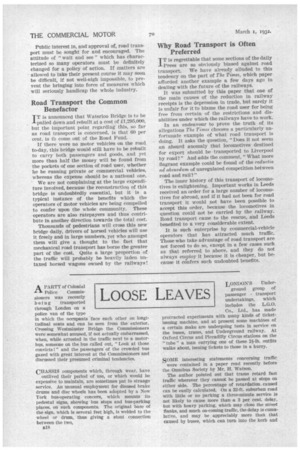Road Transport the Common Benefactor
Page 36

If you've noticed an error in this article please click here to report it so we can fix it.
TT is announced that Waterloo Bridge is to be -I-pulled down and rebuilt at a cost of £1,295,000, but the important point regarding this, so far as road transport is concerned, is that 60 per cent. is to come out of the Road Fund.
If there were no motor vehicles on the road to-day, this bridge would still have to be rebuilt to carry both passengers and goods, and yet more than half the money will be found from the pockets of one section of road user, whether be be running private or commercial vehicles, whereas the expense should be a national one. ' We are not complaining at the large expenditure involved, because the reconstruction of this bridge is undoubtedly essential, but it is a typical instance of the benefits which the operators of motor vehicles are being compelled to confer upon the whole community. These operators are also ratepayers and thus contribute in another direction towards the total cost.
Thousands of pedestrians will cross this new bridge daily, drivers of horsed vehicles will use it freely and in large numbers, yet who amongst them will give a thought to the fact that mechanical road transport has borne the greater part of the cost. Quite a large proportion of the traffic will probably be heavily laden untaxed horsed wagons owned by the railways !




































































































